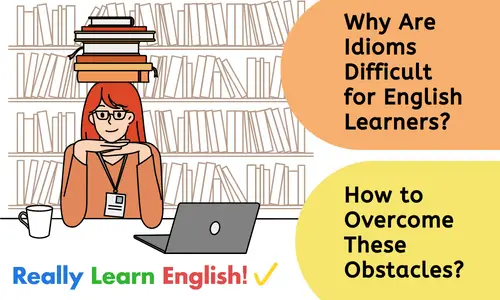Why Are Idioms Difficult for English Language Learners and How to Overcome These Obstacles?

Lesson Table of Contents
A) Why Are Idioms Difficult for Learners
B) How to Teach Idioms to English Learners
1) Literal Definition vs. the True Meaning Idioms
4) The Right Variety of Idioms
9) Role-Playing (Plus a Role-Play Dialogue Focusing on Idioms)
C) Additional Points to Consider when Teaching Idioms
- Idiomatic Expressions, Phrasal Verbs, or Fixed Expressions
- Idioms to Add Personality and Color to Language
Click Here for Step-by-Step Rules, Stories and Exercises to Practice All English Tenses
Why Are Idioms Difficult for Learners
Idioms often have figurative meanings that are not easily understood by those who are not native speakers of the language.This is different than the literal meaning of "talk is cheap", which would be that speaking is not expensive. So it does not make much sense if taken literally.
Similarly, the phrase "raining on someone's parade" means to ruin someone's plans or happiness.

Regional Idioms
In addition to being difficult to understand, idioms can also be challenging for English language learners because they are not always used consistently. Some idioms may be more common in certain regions or among certain groups of people, and they may not be understood by those who are not familiar with them.How to Teach Idioms to English Learners
There are several ways to help English language learners understand and use idioms:1) Provide a literal definition as well as the true meaning of the idiom.
This will help learners see where the idiom comes from.For example, in our last example ("raining on someone's parade") the literal meaning paints a picture of an organized parade, ruined by the rain. People are standing wet, and the parade has a hard time going forward.

2) Give many examples.
Examples are a great way to help learners understand how an idiom is
used in different contexts.For example, let's look at some sample sentences with the idiom "raining on someone's parade":
- "I'm sorry I rained on your parade by canceling our plans for the weekend."
- "I don't want to rain on your parade, but I think we should consider all of our options before making a decision."
- "I don't want to be the one to rain on your parade, but I think we should talk about the budget before we book that expensive vacation."
- "To make sure no one rains on our parade, we should double-check all of the details before making any commitments."

3) Have learners create examples
or conversations which use the idiom.
This will help them better understand them and practice using them
correctly.Encourage English language learners to practice using idioms in context, either through conversation or writing exercises.
This can help them get a feel for how idioms are used and how they fit into the structure of a sentence.
4) Expose learners to a
variety of idioms, but not too many at once.
Helping learners learn a variety
of idioms can broaden their understanding of the language and
make it easier for them to use idioms appropriately.
5) Use visual aids.
Using pictures or other visual aids can help learners understand the
figurative meaning of an idiom more easily. For example, see our English
idiom videos.
6) Play idiom games.
There are many games and activities that can help learners practice
using idioms in context. For example, you could play a matching game where learners have to match idioms to their definitions, or create a word search with idioms hidden within it.
7) Use resources.
There are many resources available, such as dictionaries
and
websites, that provide definitions and examples of idioms.These can be a great help to English language learners who are trying to make sense of the many idioms used in texts and conversations.
8) Create lists of idioms.
Have learners create a list of idioms that they encounter in their
reading or listening materials. They can then research the meanings
of the idioms and find their definitions.
9) Use
role-playing.
Have learners practice using idioms in role-playing situations. For example, they could pretend to be in a conversation with a friend and use idioms to express themselves.
Here is an example of role-playing focusing on idioms:
Gina: Hey, Josh. Can we talk for a minute?Josh: Sure, what's up?
Gina: I just wanted to bring up something that's been bothering me. I feel like we've been talking about expanding our business for months now, but nothing has happened.
Josh: Yeah, I know. It's been tough to find the right opportunities and make the necessary investments.
Gina: But that's just it talk is cheap. We can talk about expanding all we want, but if we don't take action, it's not going to happen.
Josh: I understand where you're coming from, Gina. I know I need to bite the bullet and take some risks if we want to grow our business.
Gina: Exactly. And I'm willing to do the same. But I just feel like we're not on the same page. It's like we're talking past each other instead of seeing eye to eye.
Josh: You're right, Gina. I apologize if I haven't been clear about my commitment to expanding our business. I'm ready to take action and make it happen.
Gina: Fantastic, I'm glad to see we're on the same page. I think we can really make some headway if we're in this together and keep our eyes on the prize.
Josh: Definitely. Let's make it happen.
In this dialogue, the following idioms were used:
- "Talk is cheap": It is easy to say something, but it is more difficult to follow through and take action.
- "Bite the bullet": To face and accept something difficult or unpleasant.
- "Talking past each other": when people are discussing different subjects while believing they are talking about the same thing, resulting in a lack of understanding or communication.
- "See eye to eye": To agree or have the same opinion as someone else.
- "On the same page": To have the same understanding or agreement.
- "Make headway": To make progress or advance.
- "Keep your eyes on the prize": To focus on a goal or objective.
10) Balance the study of
idioms with other language skills.
While idioms can be an interesting and fun aspect of learning a
language, it is important to not over-emphasize them at the expense
of other language skills. Balance the study of idioms with other aspects of language learning, such as grammar, vocabulary, and speaking skills.
Additional
points to consider when teaching idioms to English language
learners:
As mentioned, idioms can vary by region
and culture. Some idioms may be more commonly used in certain
parts of the English-speaking world, or among certain groups of
people.
Idioms
can be idiomatic expressions, phrasal verbs, or fixed
expressions:
Idioms can take many different forms, including idiomatic
expressions (e.g. "break a leg" = good luck), phrasal
verbs (e.g. "take off" = leave the ground), and fixed
expressions (e.g. "the whole nine yards" = everything). It is important to understand the different forms that idioms can take and teach them appropriately.
Idioms can change over time
Idioms can change over time and may not always be used consistently.
Be aware of this and encourage learners to use resources, such as
dictionaries or online resources, to learn the true meanings of
idioms.Idioms can be used for emphasis or to add personality to language
Idioms can be used to add emphasis or personality to language. Encourage learners to use idioms appropriately to add interest and variety to their language.Idioms can be challenging for learners, but they can also be fun and interesting to learn. Encourage learners to embrace the challenge of learning idioms and enjoy the process of learning more about the language and culture!
Get Updates, Special Offers, and English Resources
Download your FREE GIFT (the first two chapters of
English Short Stories Book and Workbook)
as soon as you join!

By submitting your email, you consent to receiving updates and newsletters from us and to the sharing of your personal data with third parties for the purposes of sending you communications. We will not spam you. You can unsubscribe at any time. For more information, please see our privacy policy.





